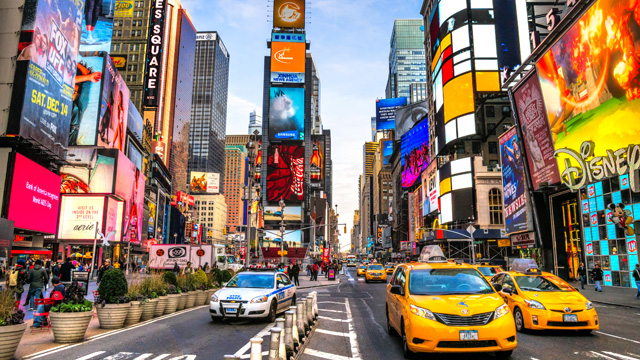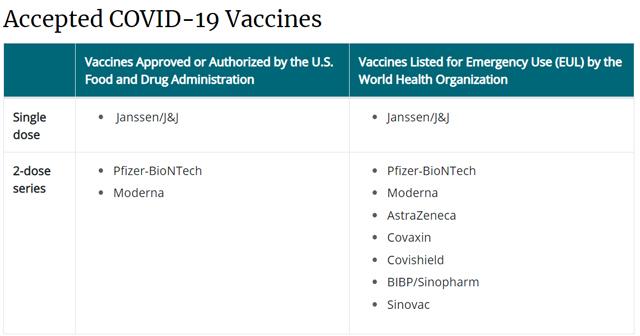
The United States on November 8 reopened its borders to foreigners, ending 20 months of restrictions due to the COVID-19 pandemic. The vaccine from China's Sinovac, the most widely avilable jab in the Philippines, is accepted. This new international air travel policy took effect at 12:01 a.m. Eastern Time (1:01 p.m. in Manila).
Here are the latest United States travel requirements:
For U.S. citizens, U.S. nationals, U.S. lawful permanent residents, and immigrants
- For fully vaccinated: Proof of vaccination and negative COVID-19 test result taken no more than three days before travel
- For those not fully vaccinated: A negative COVID-19 test result taken no more than one day before travel
- Children below two years old: No need to test.
- For recently recovered from COVID-19: Present documentation of recovery from COVID-19, such as a positive COVID-19 test result taken no more than 90 days before the flight and a letter from a licensed healthcare provider or public health official stating you were cleared to travel
For non-U.S. citizen, non-U.S. immigrants
- Must be fully vaccinated before boarding a flight
- Must show a negative COVID-19 test result or documentation of recovery from COVID-19 when traveling to the U.S. by air
- Wearing of masks over nose and mouth is required in indoor areas of public transportation (including airplanes) traveling into, within, or out of the U.S. and indoors in U.S. transportation hubs
If you are not fully vaccinated against COVID-19, you will only be allowed to enter if you meet the criteria for exemption. This includes:
- Persons on diplomatic or official foreign government travel
- Children under 18 years of age
- Persons with documented medical contraindications to receiving a COVID-19 vaccine
- Participants in certain COVID-19 vaccine trials
- Persons issued a humanitarian or emergency exception
- Persons with valid visas [excluding B-1 (business) or B-2 (tourism) visas] who are
- citizens of a foreign country with limited COVID-19 vaccine availability
- Members of the U.S. Armed Forces or their spouses or children (under 18 years of age)
- Sea crew members traveling with to a C-1 and D nonimmigrant visa
- Persons whose entry would be in the national interest, as determined by the Secretary of State, Secretary of Transportation, or Secretary of Homeland Security (or their designees)
Who are considered fully vaccinated when traveling to the U.S.?
- Two weeks (14 days) after an accepted single-dose vaccine
- Two weeks (14 days) after your second dose of an accepted 2-dose series
- Two weeks (14 days) after you received the full series of an active (not placebo) COVID-19 vaccine in the U.S.-based AstraZeneca or Novavax COVID-19 vaccine trials
- Two weeks (14 days) after you received two doses of any "mix-and-match" combination of accepted COVID-19 vaccines administered at least 17 days apart.
What are the accepted COVID-19 vaccines?
For single-dose vaccine, Jannsen (Johnson & Johnson) is accepted.
For two-dose vaccines, Pfizer-BioNTech, Moderna, AstraZeneca, Covaxin, Covishield, BIBP/Sinopharm, and Sinovac are accepted.

Do you need to quarantine after arrival in the U.S.?
All travelers should self-monitor for COVID-19 symptoms, the Centers for Disease Control and Prevention (CDC) said. If symptoms develop, traveler should isolate and get tested.
For those who are not fully vaccinated, the CDC recommends:
- Stay home and self-quarantine for a full seven days after travel even if you tested negative at three to five days.
- If you don't get tested, stay home and self-quarantine for 10 days after travel.
Who are prohibited from entering U.S.?
- You have been exposed to COVID-19 unless you are fully vaccinated or recovered from COVID-19 in the past 90 days.
- You are sick.
- You tested positive for COVID-19 and haven't ended isolation.
- You are waiting for results of a COVID-19 test.
Hey, Spotters! Check us out on Viber to join our Community and subscribe to our Chatbot.
Source: Spot PH
No comments:
Post a Comment